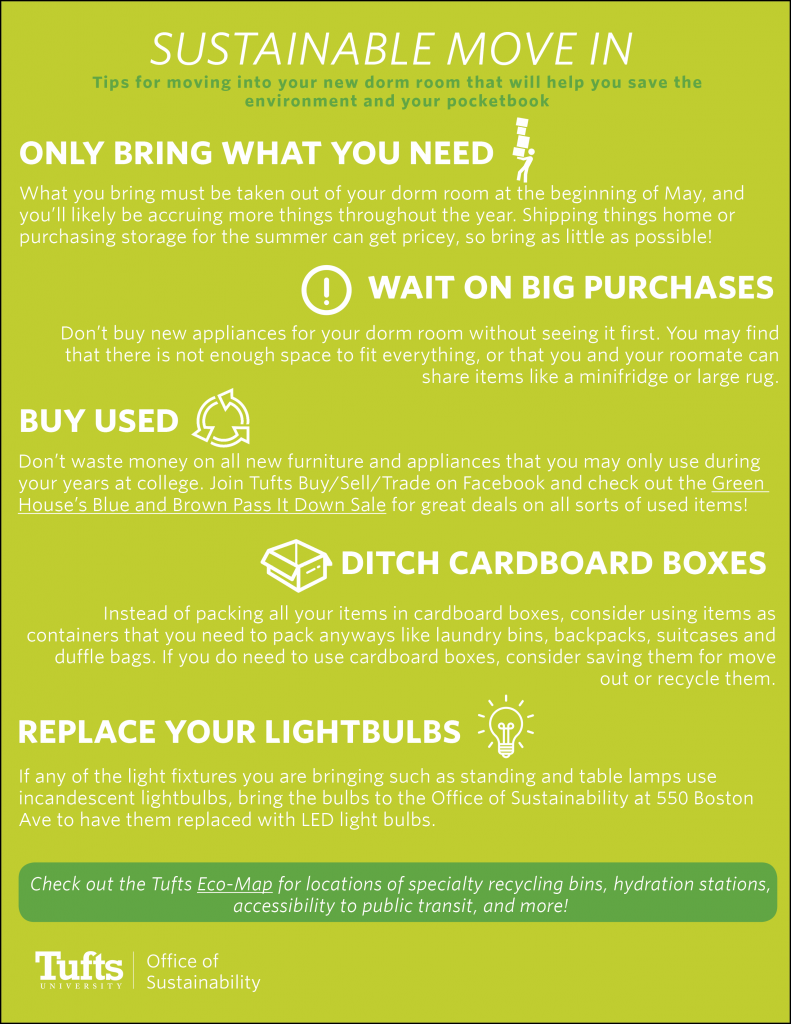With August fast approaching, it is getting to be that time of year when students start thinking about moving in to their Tufts residence for the upcoming school year!
Whether you are a returning student or a incoming first-year student, the Office of Sustainability has a few tips to make your move-in a greener one! Read on for details, and some PSAs from our Recycling Fellow.
Only Bring What You Need
This one is self-explanatory, but it’s an important one! The less you bring, the less packaging you’ll waste. In addition, it may be one less box to ship if you’re moving in from far away.
At the end of the year, so many items are left behind during move-out, which may signify that students are bringing/purchasing too many unnecessary items.
Wait On Big Purchases
Definitely wait to check-in with your room/house-mates about bringing large items to campus. If you wait to discuss logistics, you may be able to split the costs for many purchases and save a lot of money.
Additionally, you may be able to find more affordable options for some dorm room items once you get to campus (see below).
Buy Used
Don’t miss out on the second annual Blue and Brown Pass It Down Sale hosted by Tufts Green House! Many items collected during the Spring Move-Out will be available to purchase at the lowest prices around. This is a great place to get lamps, rugs, hangers, and other items you might need for your dorm room.
Additionally, Tufts Buy/Sell/Trade is a private Facebook Group for those with tufts.edu email addresses to exchange items, where many useful items are often posted.
Ditch Cardboard Boxes
Why use a cardboard box when you could use items you need to bring with you anyways, such as backpacks, duffel bags, suitcases, laundry bins and other containers. Not only will you reduce waste, you’ll also save space!
If you need to use cardboard boxes (if you are shipping items, for example), consider breaking them down and storing them under your bed until move-out. View the Recycling Fellow PSA below about cardboard box recycling for more reasons to ditch the boxes.
Replace Your Lightbulbs
Bring any incandescent lightbulbs to the Office of Sustainability at 550 Boston Ave and we will replace them with LED light bulbs, free of charge.
This is a part of an effort to reduce energy emissions from Tufts campuses. LED lights last much longer than incandescent lightbulbs, but are often much pricier. Definitely take advantage of this sweet deal!
Recycling Fellow PSAs:
Please bring any recyclables associated with your move-in to a recycling dumpster. There will be signs indicating the locations of the nearest dumpster to each dorm. You can also view our online Eco-Map for outdoor recycling locations.
If you have any questions about what can or can’t be recycled, please ask one of the Eco-Reps who will be walking around the dorms.
Please do not discard cardboard boxes in any location in the dorms. You must bring broken down cardboard boxes to the nearest recycling dumpster (locations will be indicated on signs posted in each dorm). If you don’t bring or discard cardboard boxes you won’t have to make this trek, as an added incentive to follow our tips above!
Plastic bags and film cannot be recycled through the regular recycling stream. Please do not place these in the recycling dumpsters. Look out for signage regarding designated bins for plastic film recycling.



Find Us On Social Media!